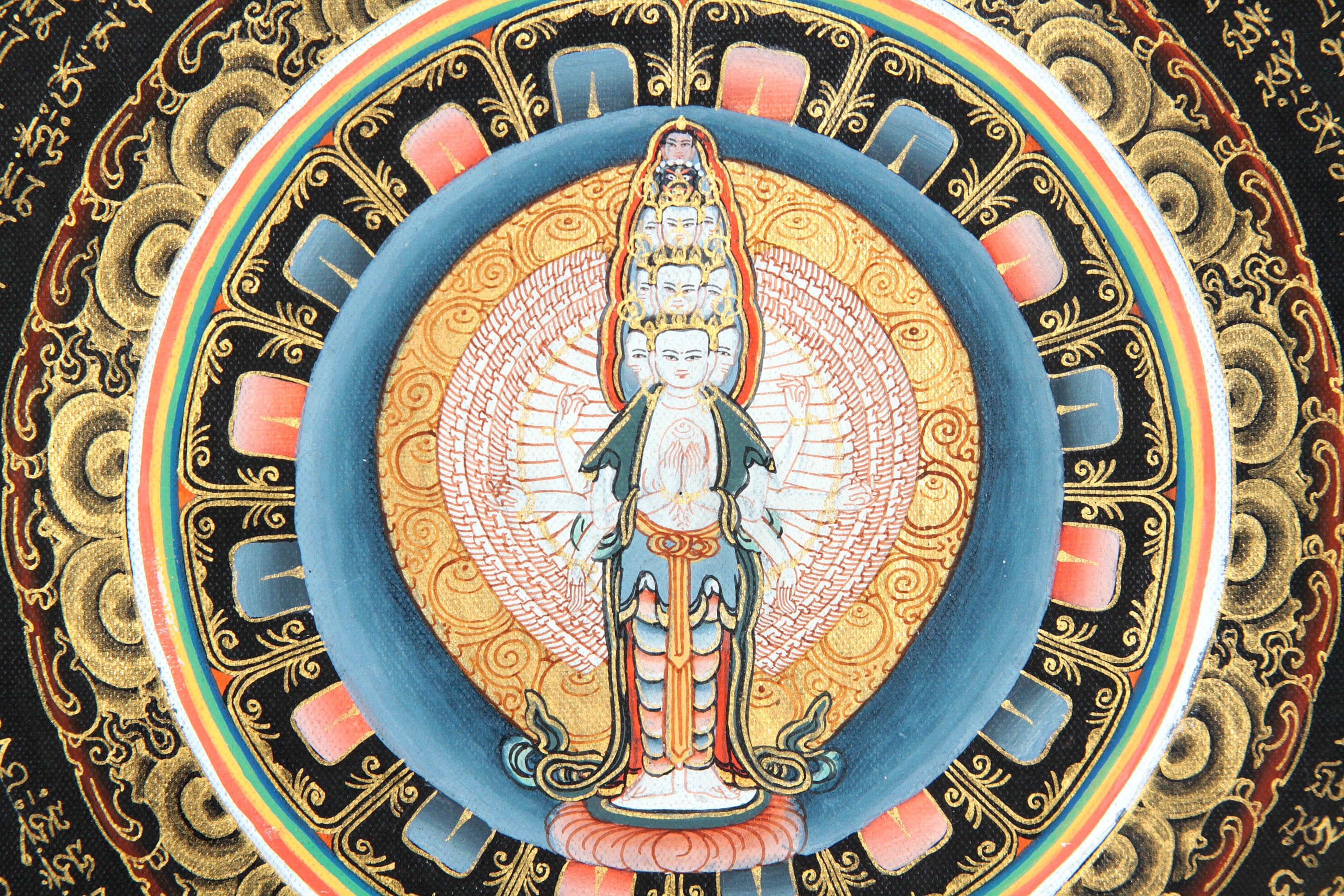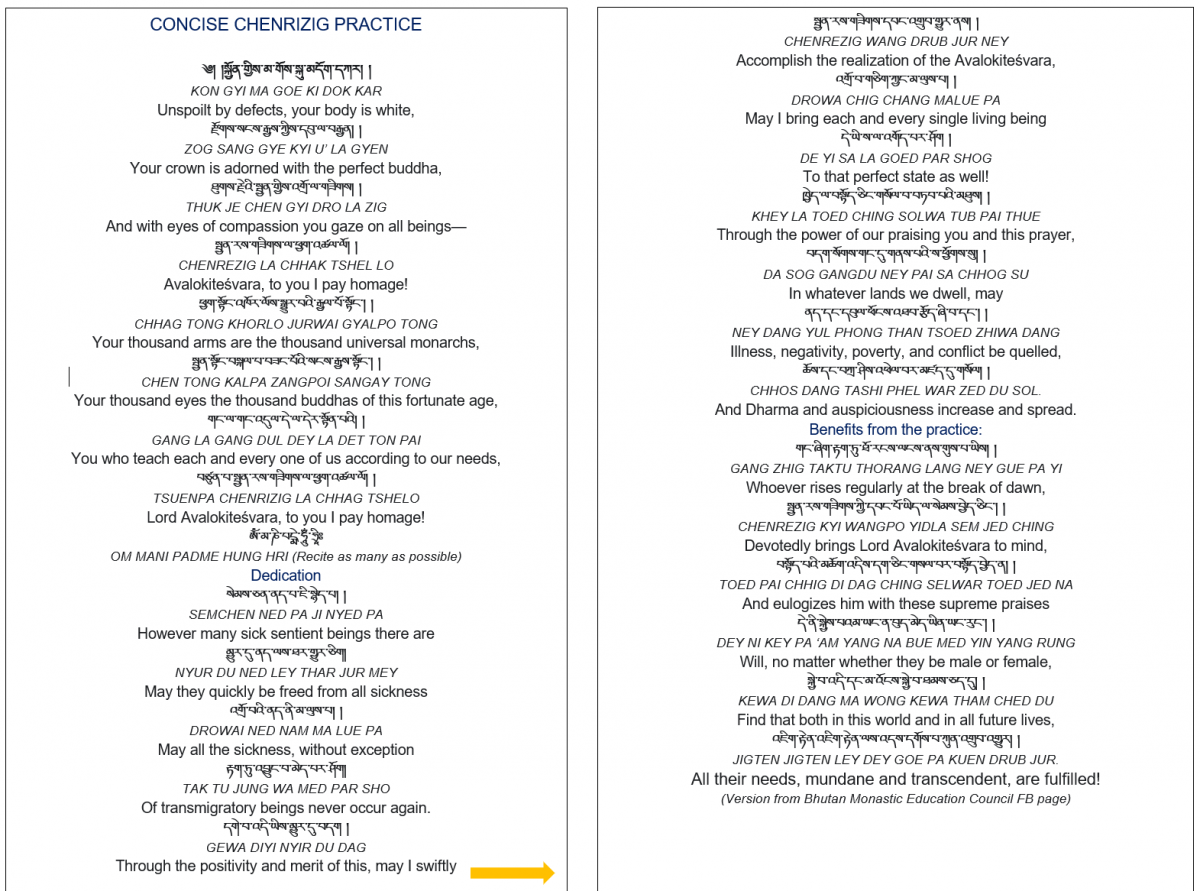
Mandala of Thousand Armed Avalokiteshvara with Syllable Mantra Exotic India Art
Auṃ Maṇi Padme Hūṃ (The mantra of the jewel within the lotus) * The Lotus Sutra of Mahayana Buddhism is the earliest text that teaches about Avalokiteshvara, who is revered in every branch of Buddhism, and is often seen with multiple arms and faces.

Mantra Of Avalokiteshvara108 “Boost Positive Energy” I Chenrezik Mantra YouTube
Oṃ Mani Padme Hūṃ / Om Mani Padme Hum Avalokiteshvara (or Avalokiteśvara) is a Bodhisattva who represents compassion, and his mantra also symbolizes that quality. Avalokiteshvara means "The Lord Who Looks Down (in compassion)". There are various forms of Avalokiteśvara ( Chenrezig in Tibetan). The four-armed form is shown here.

Mantra of Avalokiteshvara with Lyrics (Full Length Version) YouTube
The "actual" Great Compassion Mantra is cited from a different Sutra: Maha Karuna Dharani Sutra, which is available at the bottom of this feature in English. The Great Compassion Dharani is significantly longer than the Heart-dhāraṇī of Avalokiteśvara-ekadaśamukha most often incorrectly labeled. Never-the-less the benefits of both Dharnis are significant and similar and they are both.

Avalokiteshvara Mantra Andy Weber Giclee Print 36cm Pink Lotus
The Sanskrit name Avalokitesvara combines the verbal prefix ava "down," lokita, a past participle of the verb "lok" - "to notice, behold, observe", here used in a dynamic sense; and lastly "isvara," literally translates as "lord", "ruler", "sovereign" or "master".

Mantra of Avalokiteshvara (New Version) YouTube
Avalokiteshvara's Compassion Mantra. Most famous of these is Avalokiteshvaras Mani Mantra: Om Mani Padme Hum. In Tibetan pronunciation, if you prefer this, it would be: Om Mani Peme Hung.. All information on this site, including but not limited to, text, graphics, images and other material contained on this website are for informational.

Mantra of Avalokitesvara (ElevenFaced Avalokitesvara Heart Dharani Sutra)
Your thousand arms are the thousand universal monarchs, Your thousand eyes the thousand buddhas of this fortunate age, You who teach each and every one of us according to our needs, Lord Avalokiteśvara, to you I pay homage! A series of texts related to the bodhisattva of compassion, Avalokiteśvara ( spyan ras gzigs ): Aspiration Prayers

10 million Avalokiteshvara Mantra Recitation Drukpa Australia
0:00 / 24:01 Mantra of Avalokiteshvara (New Version) with Lyrics thebuddhism 35.1K subscribers Subscribe Subscribed 3.5M views 9 years ago Mantra of Avalokiteshvara When we sing along with the.

Buddhist Songs Mantra Of Avalokiteshvara With Lyrics Male Voice YouTube
Meaning and effects Stele of Sulaiman, erected at the Mogao Caves in 1348 to commemorate the donations of Sulaiman, Prince of Xining. It includes the six-syllable mantra written in six different scripts: Lantsa [1st row], Tibetan [2nd row], Uighur [far left], 'Phags-pa [left], Tangut [right], Chinese [far right]. Semantic

Mantra Avalokiteshvara Exotic India Art
[1] In the Lotus Sutra (Chapter 25), Buddha describes Avalokiteshvara-Guanyin's many manifestations this way: "Good man, if there are living beings in the land who need someone in the body of a Buddha in order to be saved, Bodhisattva Perceiver of the World's Sounds immediately manifests himself in a Buddha body and preaches the Law for them.

Mantra de Avalokiteshvara recitado 108 veces por Gueshe Sherab Choephel YouTube
In the Tibetan Buddhist pantheon of enlightened beings, Chenrezig is renowned as the embodiment of the compassion of all the Buddhas, the Bodhisattva of Compassion. Avalokiteshvara is the earthly manifestation of the self born, eternal Buddha, Amitabha. He guards this world in the interval between the historical Sakyamuni Buddha, and the next.

Mantra of Avalokiteshvara Tibetan Chú Đại Bi Tiếng Phạn YouTube
The Heart Sutra is chanted in many Buddhist monastery ceremonies. It is a highly philosophical, paradoxical, and spiritual text. Its full title is the "Heart of the Great Perfection of Transcendent Wisdom: Bhagavati Prajna Paramita Hridaya" (Rinpoche and Donyo 1994).Once when the Buddha himself entered the meditative state of Profound Illumination, the Noble Avalokiteshvara answered.

Mantra of Avalokiteshvara (A quick 10 mins Power Chant) with Lyrics YouTube
Notes on the Avalokiteśvara Mantra. The earliest known text containing this mantra is the Kāraṇḍavyūha Sūtra. The Kāraṇḍavyūha has not been translated into English but is the subject of an indepth study in Alexander Studholme's book The Origins of Oṃ Maṇipadme Hūṃ : a Study of the Kāraṇḍavyūha Sūtra.The Kāraṇḍavyūha contains elements which are later equated.

अवलोकितेश्वर का मंत्र Mantra of Avalokiteśvara with Lyrics (觀世音菩薩) YouTube
The High King Avalokitesvara Sutra. Namo Avalokitesvara Bodhisattva Namo Buddhaya, Namo Dharmaya, Namo Sanghaya, An affinity with the pure lands opens the dharma doors, By engaging permanence, bliss identity and purity, one is blessed with the dharma. Namo Maha Prajna Paramita, a great spiritual mantra. Namo Maha Prajna Paramita, a great wisdom.

Avalokitesvara mantra Wildmind
The mantra OM MANI PEME HUNG (Sanskrit: OM MANI PADME HUM) is constantly on the lips and in the minds of countless Buddhists in the Himalayan region. This mantra is also recited by devotees of Avalokiteshvara in China and Korea. In the thangka above, Avalokiteshvara is painted in the popular form of "Four Armed Chenrezig."

Mantra Of Avalokitesvara YouTube
世尊我此神咒有大威力。 (Bhagavat [World-Honored One, the Buddha], this dhāraṇī of mine [Avalokiteśvara] is impregnated with magnificent power.) 若誦一遍即能除滅四根本罪。 (A single recitation will instantaneously eliminate the four cardinal sins) 及五無間令無有餘。 ( and release all the sinners in the five eternal hells.)

Great Compassion Avalokitesvara Mantra Da Bei Zhou 大悲咒 Lyrics YouTube
Piece of Music: Auṃ maṇi padme hūṃ, Namo ratna trayaya Avalokiteśvara is one of the central figures of Buddhism whose name is often associated with several mantras chanted by practitioners to gain psychological and spiritual powers.